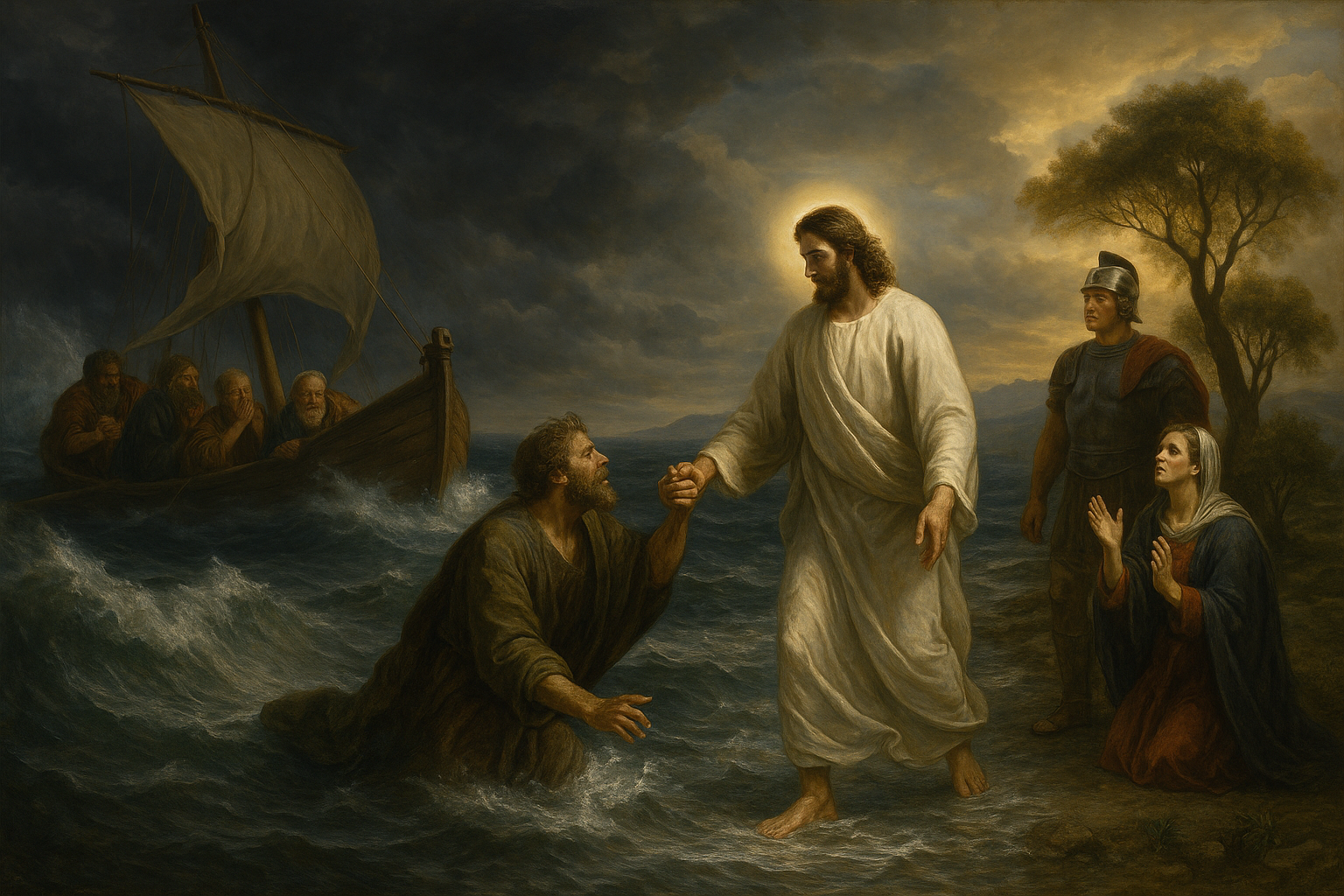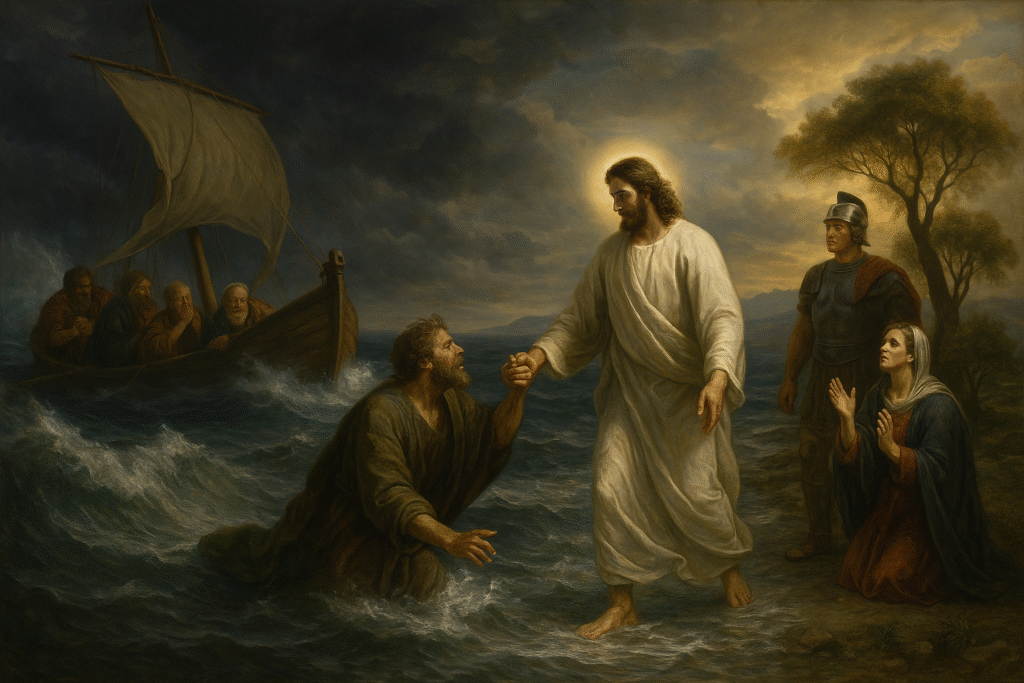Physical Address
304 North Cardinal St.
Dorchester Center, MA 02124
Physical Address
304 North Cardinal St.
Dorchester Center, MA 02124
With Michael Walker
With Michael Walker

A message to the New Creation…

Faith is not a scoopable substance doled out by the ounce; it is revelation switched on, a current that flows from the unseen into the seen. When people speak of “more faith,” they often imagine a measuring cup, and that picture quietly sabotages the very thing they’re reaching for, because it implies that a person could truly trust Yahweh and yet be dismissed as irrelevant for lacking a certain quantity. Scripture paints a different portrait. Faith is the assurance and conviction of realities we cannot see with our eyes, and that assurance does not begin as math; it begins as revelation. The thesis here is simple and searching: little faith is little revelation, and great faith is great revelation. Measured not by ounces but by sight—by how fully the heart has recognized who stands before us and what His word accomplishes when we trust Him. This is the current we want to trace: how faith moves as revelation from wave to matter, from unseen to seen, from hearing to acting, from promise to performance, and how Yehoshua both corrects little revelation and delights in great revelation. The Scriptures set the tone: “Now faith is the assurance of things hoped for, the conviction of things not seen” (Hebrews 11:1, NASB). That is not a unit of measure; that is a mode of seeing.
Faith, then, is a current rather than a commodity. It flows from Yahweh’s voice and nature into our lived moments, turning what is promised into what is practiced. Hebrews 11 does not list people who possessed a certain numerical portion of faith; it lists people whose revelation of Yahweh carried them into acts that matched His word across time—building an ark before rain, leaving a homeland without a map, conceiving when bodies said “impossible,” blessing sons with outcomes not yet visible, refusing palatial pleasures for a better inheritance (Hebrews 11, passim, NASB). In each case, the current flowed because revelation had taken root: they were persuaded of the unseen and organized their lives around that sight. This is why it is better to speak of faith as the bridge between wave and matter—the wave being the unseen reality and voice of Yahweh, and the matter being the embodied outcome in our world. The bridge is revelation-trust, not arithmetic. Mark’s record underscores the same dynamic: “Have faith in God. Truly I say to you, whoever says to this mountain, ‘Be taken up and cast into the sea,’ and does not doubt in his heart, but believes that what he says is going to happen, it will be granted him” (Mark 11:22–23, NASB). Here faith is a current with a direction—Godward certainty issuing in speech and action—not a quantity in a vial.
This explains Yehoshua’s sharp but loving rebukes about “little faith.” He used that phrase when the disciples had facts and proximity yet were short on revelation. In the storm, they stood with the Lord of wind and sea in their boat, the very One through whom all things were made, and yet fear shouted louder than revelation; He said, “Why are you afraid, you men of little faith?” before rebuking the winds and the sea (Matthew 8:26, NASB). When Peter stepped out on the water by a word, walked, looked at the wind, began to sink, and cried out, Yehoshua reached out and said, “You of little faith, why did you doubt?” (Matthew 14:31, NASB). When the disciples fretted about not bringing bread—even after witnessing multiplied loaves—He said, “You men of little faith, why do you discuss among yourselves that you have no bread?” and reminded them of what they had just seen (Matthew 16:8, NASB). In each case they had the matter—the miracle—right before their eyes, and yet the wave, the depth of who He was and what His word meant for the next moment, had not yet opened fully in them. Little faith here is not atheism; it is revelation not yet mature. It is holding a burning lamp and still fearing the dark.
By contrast, Yehoshua praises great faith wherever revelation breaks through cleanly. The centurion perceived authority without needing spectacle: “Just say the word, and my servant will be healed.” When He heard this, He marveled and said, “Truly I say to you, I have not found such great faith with anyone in Israel” (Matthew 8:8–10, NASB excerpted). The Canaanite woman discerned mercy beyond boundary and persisted until He said, “O woman, your faith is great; it shall be done for you as you wish” (Matthew 15:28, NASB). In Samaria, encounter turned to confession as many believed and then testified, “This One is indeed the Savior of the world” (John 4:42, NASB), a sweeping recognition born of revelation rather than religious pedigree. In these scenes, great faith is not a gigantic portion poured into a container; it is revelation that leaps directly to who Yehoshua is. It sees the wave without demanding the matter as precondition. It recognizes the authority in the Speaker without calculating odds from the circumstance. It is tuning to the frequency before the sound hits the air.
The well-known mustard seed sayings become luminous in this frame because Yehoshua uses deliberately conditional language. “If you have faith the size of a mustard seed, you will say to this mountain, ‘Move from here to there,’ and it will move” (Matthew 17:20, NASB). “If you had faith like a mustard seed, you would say to this mulberry tree, ‘Be uprooted,’” and it would obey (Luke 17:6, NASB). The point is not that faith can be conveniently tiny and still “work,” as though He were offering a minimal viable dosage; the point is that living revelation—even in its smallest true expression—contains the whole. A seed is not a fragment; it is the life of the tree in compact form. So the condition highlights quality and vitality, not measurable quantity. Faith that is alive to who He is carries the nature of the tree, and therefore it speaks and acts in alignment with that nature. This rescues the saying from sentimental minimalism and restores it to its sharp, authoritative edge: the smallest living root of real revelation wields mountain-moving force because of the life it contains, not because we can weigh it.
This also clarifies why familiarity can conceal rather than reveal. Those closest to daily miracles can become dulled to their depth, mistaking exposure for understanding, touching matter while ignoring wave. Those who had no prior scaffolding sometimes received sharper revelation precisely because they were not insulated by routine. The centurion had no covenant library of proofs, yet he saw authority; the Canaanite woman had no historical claim, yet she saw mercy. Familiarity can turn the ocean into background noise; first encounter can feel its vastness instantly. This is not to shame insiders; it is to warn us that proximity is not penetration. Where revelation has not opened deeply, little faith will wobble even when the facts pile high. Where revelation pierces, great faith stands even when facts seem thin.
Because faith is revelation-current rather than rationed quantity, Scripture is comfortable with both instant and gradual outcomes. Some healings are immediate, and other promises ripen through seasons and tests. The prayer of faith “will restore the one who is sick” and forgiveness is intertwined with that act (James 5:15, NASB), yet Hebrews 11 honors saints who “died in faith, without receiving the promises, but having seen them and welcomed them from a distance” (Hebrews 11:13, NASB). This does not depict faith failing over time; it depicts faith flowing over time. Abraham is the template: “In hope against hope he believed,” not staggering at the promise, being “fully assured that what God had promised, He was able also to perform” (Romans 4:18–21, NASB). The current may surge in a moment or carry us for miles, but in both cases what matters is not an amount we clutch; it is the revelation of the One we trust.
Bring this into the modern scene, and the distinction becomes practical without becoming mechanical. I consider myself a seasoned believer who at times, when small disruptions strike, a bill due, a delay, a broken piece of the day—lets the problem swell in the imagination until it seems larger than Yahweh. The reflex is to plot and fix as though the burden rests on self. That is not apostasy; it is revelation slipping, a moment in which the lens fogs and the circumstance eclipses the face of the Father. That is the echo of, “O you of little faith.” The lamp is still in hand, but for a moment we forget the room is already lit (Matthew 8:26; 14:31; 16:8, NASB). Now set that beside a different moment: receiving the “wave to matter” deep dive itself. That insight was not engineered by cleverness; it was received in dependence. I leaned into the Father, and the revelation flowed. That is great faith: not greater effort but deeper revelation, the confession that Yahweh is the source and Yehoshua is the Lord of the wave that becomes matter through your obedience. That is what He praises in the centurion and the Canaanite, and that is what He forms in His disciples still (Matthew 8:10; 15:28, NASB).
Seen this way, the whole pattern becomes instruction rather than abstraction. When Yehoshua says “O you of little faith,” He is not scoffing at a small percentage; He is calling the heart back to revelation—remember who is in your boat, who called you onto the water, who multiplied bread yesterday and will not abandon you today. When He says “great is your faith,” He is honoring revelation that has pierced through: the heart that calls Him Lord without demanding proof, the will that agrees with His authority and speaks accordingly, the persistence that refuses to reinterpret Him through the lens of delay. His words are not about volume; they are about sight. And because faith speaks, He ties revelation to speech and request: “Have faith in God… whoever says… and does not doubt in his heart… it will be granted him” and “all things for which you pray and ask, believe that you have received them, and they will be granted you” (Mark 11:22–24, NASB). This is instruction for a life of current—ask in alignment with revelation, speak in alignment with revelation, act in alignment with revelation.
Gather the threads and the wave-to-matter picture clarifies everything. Great faith is great revelation. It is recognizing the wave—the Person, the authority, the mercy—without waiting for matter to appear first. Little faith is little revelation. It is staring at matter—the storm, the wind, the empty basket—and missing the wave within it. The New Creation is not summoned to out-measure anyone; we are summoned to see. Where revelation of Yehoshua is deep, the current flows—sometimes as a flash that moves mountains, sometimes as a river that carries us through a week, a year, a lifetime. The Scriptures have already charted the way: assurance of the unseen (Hebrews 11:1), rebukes that recall us to revelation (Matthew 8:26; 14:31; 16:8), commendations that celebrate revelation (Matthew 8:10; 15:28; John 4:42), promises that bind asking to believing (Mark 11:22–24), prayers that heal (James 5:15), and patriarchal stories that model endurance without dilution (Romans 4:18–21; Hebrews 11:13). Let the measurement metaphor die; let the current live. Let us refuse to make small things larger than Yahweh, and let us keep receiving what only the Father gives—revelation of His Son. Then our faith won’t be a ration to manage; it will be a river to walk in, and Yehoshua’s words over us will change in tone: less of “little faith” lament, more of “great faith” joy.